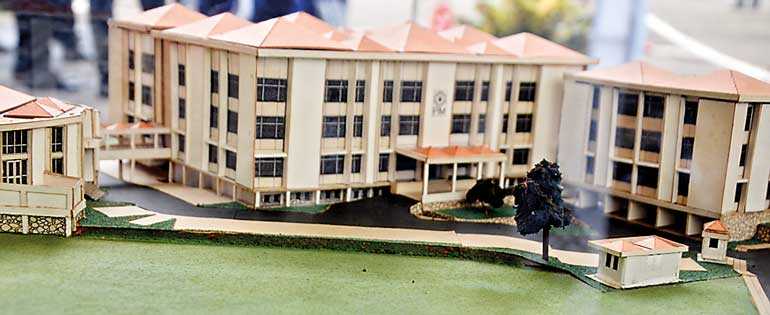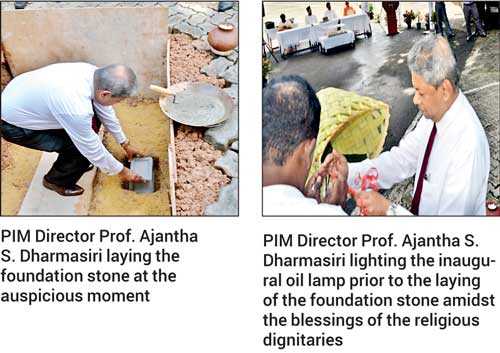Monday Feb 16, 2026
Monday Feb 16, 2026
Thursday, 26 September 2019 02:05 - - {{hitsCtrl.values.hits}}

PIM Director Prof. Ajantha S. Dharmasiri addressing the august assembly prior to the laying of the foundation stone

A miniature-model of the Postgraduate Institute of Management as to how it would be seen on completion of the new building
The Postgraduate Institute of Management, the nation’s management mentor, on its march to fulfil the mandate to provide the country’s much-needed echelons of management has now reached the desired maturity after three decades of excellence. Its continued performance excellence has earned a brand identity, and the resultant demand to cater to a larger clientele has, obviously, compelled the Institute to expand to accommodate a larger intake of management postgraduate aspirants. 
It is with this sacred intention that the PIM launched the construction of the second phase of its building, a ‘mirror- image’ of the existing structure, by laying the foundation stone at a specially laid site, at the auspicious time, on Monday, 2 September by PIM Director Prof. Ajantha S. Dharmasiri, amidst the chanting of ‘Seth Pirith’ by Weragoda Gnana
Maha Thero of the Sri Lankaramaya, Lesley Ranagala Mawatha, and invoking of blessings by Ragu Sharma Kurukkal of the Ganapathy Kovil, Arunodaya Mawatha, Maulavi Shake M. Akram Noormin, Director, Noornia Arabic School, Matara, and Father Nihal Ivan Perera of the All Saints Church, Borella. This solemn event, a landmark in the annals of the PIM, was graced by the Institute’s faculty and staff. In today’s world of higher education, institutes face many challenges by way of brand competition, diversification, and modernising infrastructure. They, in fact, need modern, world-class infrastructure and facility management. These facilities lead to the creation of airy and spacious learning-teaching environments which are now considered as critical to any seat of higher education.
Further, the basic teaching-learning process of such an Institute should be strengthened by other ancillary facilities including a well organised and sufficiently spaced IT centre, a well-structured library, discussion rooms, adequately accommodative classrooms, record rooms, staff restrooms, faculty rooms, as well as sanitary facilities including a hygienically maintained cafeteria.
The other important components include, inter alia, an administrative hub, and a sufficiently large car-park. Taking cognisance of all these features and facilities the new building has been designed, while it represents a ‘mirror-image’ of the existing building. The estimated duration for the completion of the building is 24 months.
It is expected that the completion of the new building would create a ‘smart-campus’ for the PIM enabling it to serve the country by absorbing a larger annual intake of management postgraduate aspirants. The ceremony was compered by PIM Management Consultant K.A.I. Kalyanaratne.